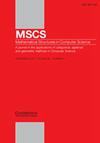你只能幸运一次:认识论目标的最佳流言
IF 0.9
4区 计算机科学
Q4 COMPUTER SCIENCE, THEORY & METHODS
引用次数: 0
摘要
众所周知,没有全局时钟的同步,就无法通过通信获得共同知识。此外,众所周知,如果不交流高层信息,就无法获得任意的高阶共享知识。在这里,我们将这一结果精确地应用于代理人通过一对一通话来分享秘密的闲聊中:我们证明 "每个人都知道每个人都知道每个人都知道所有秘密 "在闲聊的知识逻辑中是不可满足的。我们还证明,给定 n 个代理人,要达到 "有人知道每个人都知道所有秘密",2n-3$ 的通话是最优的;要达到 "每个人都知道每个人都知道所有秘密",$n - 2 + \binom{n}{2}$ 的通话是最优的。本文章由计算机程序翻译,如有差异,请以英文原文为准。
You can only be lucky once: optimal gossip for epistemic goals
It is known that without synchronization via a global clock one cannot obtain common knowledge by communication. Moreover, it is folklore that without communicating higher-level information one cannot obtain arbitrary higher-order shared knowledge. Here, we make this result precise in the setting of gossip where agents make one-to-one telephone calls to share secrets: we prove that “everyone knows that everyone knows that everyone knows all secrets” is unsatisfiable in a logic of knowledge for gossiping. We also prove that, given n agents, $2n-3$ calls are optimal to reach “someone knows that everyone knows all secrets” and that $n - 2 + \binom{n}{2}$ calls are optimal to reach “everyone knows that everyone knows all secrets.”
求助全文
通过发布文献求助,成功后即可免费获取论文全文。
去求助
来源期刊

Mathematical Structures in Computer Science
工程技术-计算机:理论方法
CiteScore
1.50
自引率
0.00%
发文量
30
审稿时长
12 months
期刊介绍:
Mathematical Structures in Computer Science is a journal of theoretical computer science which focuses on the application of ideas from the structural side of mathematics and mathematical logic to computer science. The journal aims to bridge the gap between theoretical contributions and software design, publishing original papers of a high standard and broad surveys with original perspectives in all areas of computing, provided that ideas or results from logic, algebra, geometry, category theory or other areas of logic and mathematics form a basis for the work. The journal welcomes applications to computing based on the use of specific mathematical structures (e.g. topological and order-theoretic structures) as well as on proof-theoretic notions or results.
 求助内容:
求助内容: 应助结果提醒方式:
应助结果提醒方式:


